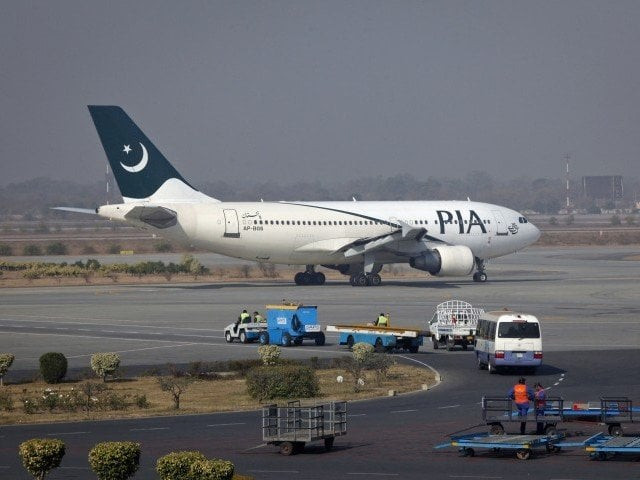Federal Aviation Minister Ghulam Sarwar on Wednesday said the initial report into the May 22 PIA plane crash in Karachi had found that “human error” by the pilots and air traffic control (ATC) officials was to blame for the disaster in which 97 people had perished and there was no technical fault in the aircraft.
Announcing the findings of the report in the National Assembly, the minister said the pilots were distracted because they were discussing the coronavirus pandemic throughout the flight, particularly half an hour before the crash.
“They were not focused and overconfident. Their families were affected by corona. Their lack of concentration caused the crash,” he added.
“He [Captain Sajid Gul] was an extremely experienced pilot. It’s sad that such a major incident occurred because of the overconfidence and lack of focus of the pilot and the co-pilot.”
Sarwar elaborated that the pilot had not identified any technical fault on the final approach, adding that the aircraft should have been at an altitude of 2,500 feet when it was at a distance of 10 miles from the runway. However, it was at around 7,220 feet at that time.
The minister continued that the control tower had informed the pilot thrice that the plane was too low to land but he refused to listen.
He also noted that the landing gears were closed when the plane was five nautical miles away from the runaway even though they were open earlier.
Pointing out another error by the pilot, Sarwar said the plane was switched from auto-landing to manual before the crash. “It [the plane] should have descended at an angle of 40 degrees but approached at 60 degrees,” he added.
“When the control tower drew the pilot’s attention towards the low altitude of the plane, the pilot replied: ‘I'll manage’. There was overconfidence.”
The minister also said besides the pilots, the cabin crew and ATC officials were also at fault as they also not following set procedures.
“The control tower did not point out the damage to the plane after a failed attempt at landing,” he added.
“They [air traffic controllers] should have informed the pilot when they saw the engines on fire but that did not happen and when the plane took off again, both the engines were damaged.”
Sarwar said there were two important pieces of evidence -- the digital flight data recorder and the cockpit voice recorder – and they were decoded in the presence of foreign experts.
“There can’t be a better documentary and reliable evidence than these two things.”
The minister added that he had heard the conversation between the pilot and the air traffic controllers himself.
“The last words of the pilot before the crash were ‘Ya Allah’ and he repeated them thrice.”
Sarwar said the plane was 100% fit and there was no technical fault in it. “Even the pilot had said this [that there was no fault in the plane] in his conversation with the control tower.”
The minister added that both the pilots were also medically fit to fly and the final report would be released within a year.
Speaking further about the aircraft, Sarwar said after the suspension of flights because of pandemic, the plane first flew on May 7 and the crash happened on May 22.
During this time, he added, the plane had successfully completed six flights -- five to and from Karachi and one to Sharjah.
“Those who have passed away, may God forgive them. Those who are alive and are responsible [for the crash] will be held accountable,” he said, maintaining that a free, fair and transparent inquiry was under way.
The minister said other major plane crashes in the country’s history had neither been investigated nor were there any reports issued.
He mentioned the Air Blue tragedy in 2010, the Bhoja Air crash in 2012, the plane crash in Chitral in 2016 and the crash landing of an aircraft in Gilgit in 2019.
“The Air Blue and Bhoja Air crashes occurred due to human error and various breaches of flying discipline, error of judgment, lack of professional skills and bad weather conditions among other factors,” he claimed.
“The technical fault in the Chitral crash is so complicated that even the plane manufacturer has not been able to reach a conclusion so far,” Sarwar said, adding that its investigation report would be presented in August this year.
PIA flight PK8303, an Airbus 320, had taken off from Lahore and crashed about a kilometre short of the runway at the Karachi airport on its second attempt to land, killing all but two of the 99 aboard.
Pilots’ degrees
The minister told the assembly that there were 860 pilots in Pakistan of which 262 were those who had not sat their exams as someone else did that for them.
He added that 40% licences were forged or the pilots did not have the required flying experience.
“People with fake degrees have been appointed on political basis, ignoring merit.”
Sarwar said an inquiry had already been initiated against fake-degree holders and show-cause notices issued to 54 pilots.
“Some of these pilots have challenged the notices in court as well. Nine pilots have confessed to having fake degrees so far.”
In the past, the minister said, the Supreme Court had ruled that the degrees of the PIA employees would be verified as four degrees were found out to be bogus.
In Pakistan, he regretted, licences could easily be obtained through bribery.
PIA privatisation
During his speech, the minister announced that the PIA would not be privatised.
“It will be restructured and the government will take it back to its glory days,” he said.
“There was a time when we laid the foundation of the Emirates and Singapore airlines, trained their officials and look at us now.”




















COMMENTS
Comments are moderated and generally will be posted if they are on-topic and not abusive.
For more information, please see our Comments FAQ